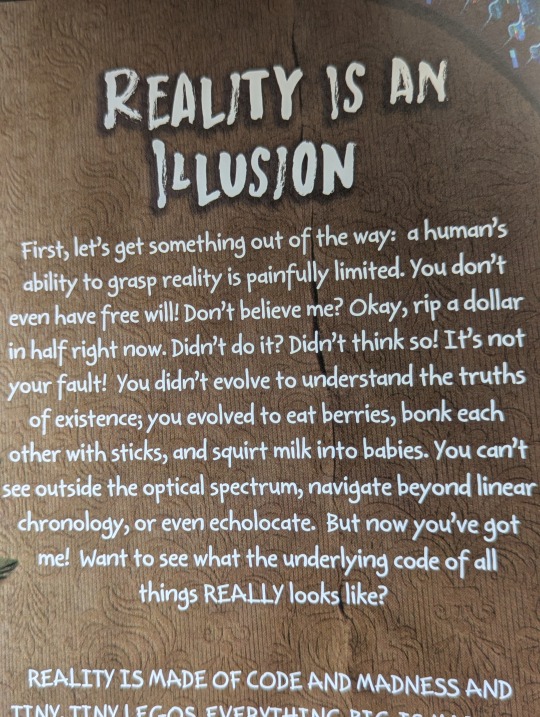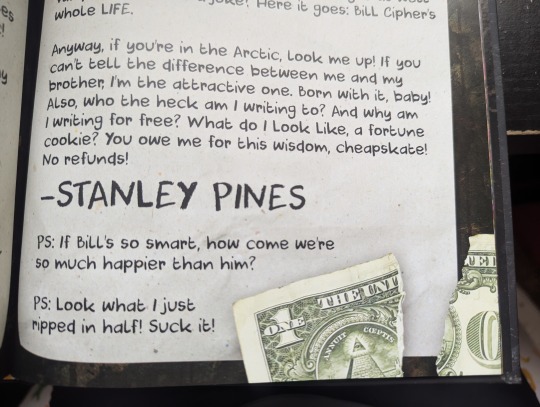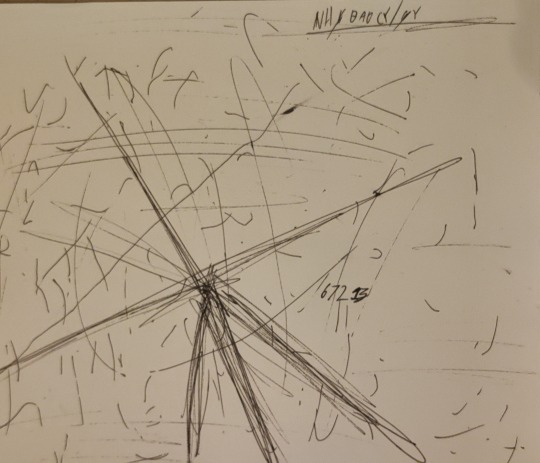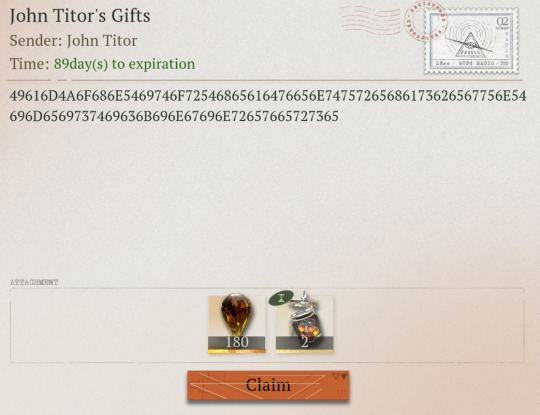#cipher encoded
Explore tagged Tumblr posts
Text

"First, let's get something out of the way: a human's ability to grasp reality is painfully limited. You don't even have free will! Don't believe me? Okay, rip a dollar in half right now. Didn't do it? Didn't think so!"
~~~~~~~~~~~~

"PS: Look what I just ripped in half! Suck it!"
~~~~~~~~
I love Stan so, so much for this.
#hello there#book of bill#book of bill spoilers#stanley pines#bill cipher#this means stan#1. read the whole fucking book and PAID ATTENTION#2. wrote a snarky insouciant response to make his brother feel better and emphasize what little control bill has over their lives#3. ripped actual money in half to his assert (and more importantly his brother's) free will#it's such a serious moment in what seems to be an unserious response#except in this same letter he encodes the message 'love ya bro' making it look like swearing#not what he seems indeed#oh boi are he and ford going to have some CONVERSATIONS#conversations which i would like to write
833 notes
·
View notes
Text

I just love @pandamasky 's Bilal
#gravity falls#bill cipher#human bill cipher#bilal#pandamasky#gravity falls fanart#stills art#i used the bill cipher cypher encoder it says i have loved the stars too fondly
62 notes
·
View notes
Text
Poet's 1st diary entry reads;
"PEEIGHPTJQQTIIAQUILRVVIKLZMLNRWQVRLGHXGVIUYCXLIXCRBYERKUORNLWSVYKINVPPSVYQXNKCWZSMFWVEFBKIEXKHNRJDQMLWPGKJWPSIGXWAFCDUBIZQBHEYRCSVFHBEFJUVAVLWOEUMQPRDCWWFUUDBUZMGZIKWWLMGMRCIPEUQVBIKSLVAVMBURRRPLSFBOBOIPDMW"
...
...
...it appears to be a cipher, of sorts.
#twice encoded.#have fun :)#i like ciphers a lot ngl theyre fun#and i think zip will like it#poet's diary#cipher#poet#ask the poet#ask the little poet#??? - 1#COLUMNAR - 2#(1 is one of the first ciphers I used - on poet's name.)#(thats how its encoded - youll prollyy have to do it backwards)
17 notes
·
View notes
Text
yknow what GOOD i'm glad there's a spy this server was missing espionage. everybody lip wags on and fuckin on about trust and secrets and hiding SHUT UP IF YOU'RE HIDING WHERE ARE THE CIPHERS. WHERE ARE THE RIDDLES. WHERE ARE THE CODED MESSAGES. WHY IS BADBOYHALO THE ONLY ONE TALKING IN METAPHORS. WE HAVE CELL "THE ENIGMA" BIT.
MAKE YOUR DAMN BASE A LABYRINTHIAN NIGHTMARE. my waystone is at the entrance and you can ONLY ENTER MY BASE IF YOU KNOW WHICH DOOR ISN'T THE ENTRANCE TO A ROOM WITH A FAKE FLOOR AND SHARKS or what the fuck ever. there's a hidden path amidst ghost blocks FOLLOW IT OR DIE. PLEASE friends there are so many POSSIBILITIES. not to be twelve years old on main but a book series i read a while back had a secret area that was only accessible via a crazy ass alice in wonderland set of puzzles that would dump you in a moat if you failed, the concept being those who knew the path would take less time to enter than those who didn't. COME ON. secret rooms in secret rooms. this is my library but shhh this is my REAL library behind the fireplace and then THIS IS MY REAL LIBRARY BEHIND THIS BOOKCASE. make the world's most unintuitive create factory for big daddy breakfast and hide something in the middle of it WHO'S GOING TO COMB THROUGH THAT MUCH MACHINERY. NO ONE. NOBODY.
like bruh. i want them leaving notes like it's prohibition and they're trying to find a speakeasy. i want them smuggling information like the revolutionary war. i want them to talk like truckers when a cop is on the frequency. i want "one if by land two if by sea" type shit. ESPIONAGE. IS. COOL. DAMNIT.
#qsmp#shut up vic#block game brainrot#LIKE IS IT REALLY TOO MUCH TO ASK FOR THE ENTRANCE TO ORDO THEORITAS TO BE MORE COMPLICATED#LIKE FUCK IT MAKE A BIG DAMN HALLWAY WITH GRAND WATERFALLS POURING FROM THE SIDES LIKE A DAMN BANK ENTRANCE IN A MOVIE#AND THEN AT THE TOP OF ONE OF THOSE WATERFALLS PUT A HOLE THAT LEADS TO AN ELEVATOR AND THAT'S THE ENTRANCE#BIG DAMN HALL ROOM WITH WATERFALLS AND A MEETING TABLE OH WOW LOOK AT THE ORDER BUT ACTUALLY THE R E A L ORDER-#HOLD MEETINGS OF MINIMAL IMPORT IN THE DECOY ROOM AND REAL IMPORTANT MEETINGS IN THE REAL ORDER#GRRRRRRRRRR I WANT ESPIONAGE#NOT ENOUGH ENCODED MESSAGES FOR A SERVER WHERE THEY ARE FOR ALL INTENTS AND PURPOSES TRYING TO OPERATE UNDER THE RADAR OF A SURVEILLANCE GOV#CMON#YOU'RE JUST SAYING THIS SHIT IN THE OPEN????#CAN I GET A BOOK CIPHER OR SOME SHIT AT L E A S T#CAN THEY BRING BACK THE WEIRD FUCKING GOOP CONSTITUTION FOR THAT LMFAO#LIKE CAN YOU IMAGINE THEY TURN THE FUCKING JOKE CONSTITUTION INTO THE KEY FOR A BOOK CIPHER LMFAO#(i can't explain a book cipher in tumblr tags but it's cool look it up!)#ESPIONAGE DAMNIT#oh and for clarity i'm not twelve the book series was for that age group#i am in fact of legal drinking age (everywhere)
31 notes
·
View notes
Text
"People kept asking me what my name really is.
Fine, it's RYTVCOXIQYZC."
3 notes
·
View notes
Text

Customized a Peepy to match my blog :)
More angles/progress photos below the cut


I exclusively used fabric paint, which gave it a stiff, vaguely papier-mache-like texture. I think that works well with this design (it's like hardened frosting!), but I might try out fabric dye or something along those lines if I ever do another one.
Anyway, if anyone out there is thinking of fabric painting a colorpy, be warned that the first coat will probably look rough:

It's possible that using a primer would help, but I can't personally speak to that since I just winged it for this attempt :)
Also, I was surprised how big of a difference the red line on the beak makes in terms of how 'finished' it looked:


#idk why the color looks so...fleshy? in the photos#it's much more of a bubblegum pink irl#Itemlabel#Peepy#Itemlabel peepy#colorpy#sprinklepy#sprinkleCipherpy#sprinkles#sC original#misadventures#misadventures in plushie customization#sprinkle cipher#the sprinkles are supposed to encode to 'sC' fwiw
17 notes
·
View notes
Text
The Viruses/Programs
Viruses
Ozymandias
Virus
Status: Active(
Ozymandias is one of a pair who once occupied an area with a Program named Leto. Both had an agreement where the other would not attack, as both knew that the other could kill it. However, when Ozymandias began to leave and destroy universes to grow stronger, Leto set out to get more power. This resulted in a fight months later, with both of them firing a shot of code that caused everyone to forget their true names.
Enraged, Ozymandias went on a rampage until reigned in by Antivirus, CPU, and Crash. It was trapped in a prison of its own code until escaping in Fleeting Sands, causing chaos, and then being drawn back in once more.
However, he escaped permanently after Raging Riptides and has been on the loose since.
Morris
Virus
Status: Deactivated
Introduced here!
Morris was a twin Virus, paired up with her sister Root. The two were viruses that were made from Ozymandis's scales that got cut off when it was escaping its prison. Morris's end goal was to siphon power from the Admins and anyone of similar power in order to free Ozymandias. However, it didn't go to plan, as Root didn't share her sister's sentiment, and Root killed Morris.
Root
Virus
Status: Active
Introduced here!
Root is a former twin Virus, having once been a twin to Morris. The duo were made from the scales of Ozymandias, but Root didn't know this as her code formed wrong. This left her with memory issues and being blind. However, as time went on, she began to remember and was horrified at the prospect of having to have all these people who cared about her die. So when she had the chance, she struck and killed Morris.
This left Root with being able to see in one eye, but she still had memory problems. She currently resides at the Showgrounds Castle.
Lockdown
Virus Status: Active/Contained
Introduced here!
A prisoner at the Containment Zone and a part of the Illusion Gang. He's the second eldest of the group and is a terrifying Virus, using his ability to force any area of code into a lockdown. Whenever she makes he attempts to escape, Warden often chases him.
Dust
Virus
Status: Active/Contained
Introduced here!
A prisoner at the Containment Zone and a part of the Illusion Gang. He's the second youngest and is a near harmless Virus, only using his abilities to help his friends make an escape after a successful plan. Whenever she makes her attempts to escape, Supervisor often chases him.
Worm (belongs to @duckapus)
Virus
Status: Deactivated
Introduced here!
Once a powerful Virus that reigned with a cruel hand, during his first inital defeat at the hands of Antivirus (a failed fusion of Glitch and a red Doomguy), he went into hiding and planned his revenge. During the events of the Legacy Arc, he re-emerged with two helpers, Mira and Garyboy. However, this still failed in the end, and he died at the hands of ClearAll.
Glitch (belongs to Duckapus)
Virus
Status: Deactivated
Introduced here!
Originally a creation of Worm, her code had the ability to damage any other code she touched. She didn't agree with her creator and hated him, but initially thought there was nothing she could do. However, she then met a red Doomguy recolor, Dave, and Matrix. While the initial fight did not go their way, in the final moments of Glitch's life, she got the friendly contacted she'd wanted for so long. From this, she and the red Doomguy fused, creating Antivirus.
Mira (belongs to Duckapus)
Virus
Status: Active
Introduced here!
Originally created by Worm to distract and distance Antivirus whenever the virus was working on his plans, she was eventually freed from his influence following his defeat at ClearAll's hands. She now resides in the Mushroom Kingdom, dating Amy Rose the hedgehog.
Garyboy (belongs to Duckapus)
Virus
Status: Active
Introduced here!
He was originally created by Worm to help him further his goals and plans. However, now that Worm is dead, he's working for another major virus: Ozymandias. While Ozymandias is still trapped in his prison, Garyboy is capable of coming and going and is spending a considerable amount of time teaching Ozymandias that brute strength alone won't win a battle.
Programs
Leto
Program
Status: Active
Introduced here / here!
Leto is one of a pair who once occupied an area with a Virus named Ozymandias. Both had an agreement where the other would not attack, as both knew that the other could kill it. However, when Ozymandias began to leave and destroy universes to grow stronger, Leto set out to get more power. This resulted in a fight months later, with both of them firing a shot of code that caused everyone to forget their true names.
Following this, it left its home in search of ways to grow its power in case of Ozymandias returning. It then found Avatar Nimbus in her universe, and due to the Avatar's preexisting insecurities, Leto was able to convince Nimbus to use its programs. This resulted in an incredibly toxic 'friendship', and Leto's manipulation only ended when Nimbus's friends came to her aid and the Program was imprisoned in its own home.
Following more antics, Leto now has Bio-Lumi, Baxter Stockman, and Disc/Rahzar working with (moreso for) her.
Hotspot (belongs to @duckapus )
Program
Status: Active
Introduced here!
Hotspot owns a bar named the Internet Cafe, called that because she doesn't have a license and is trying to keep the Moderators from coming down on her ass.
Vector (belongs to Duckapus)
Program
Status: Active
Introduced here!
Vector is a who really doesn't like the Admins. Per the post he came from; "As far as he's concerned, they're a bunch of self-righteous blowhards who act like they're in charge of everything just because they have ridiculous powers and get rid of a few viruses every once in a while. Never mind the fact that their battles, both against so-called threats and each-other, often cause far-reaching devastation, leaving everybody outside their little club to pick up the pieces."
His grievances are understandable. However, he doesn't have the full picture, and unfortunately, the barkeep he's venting to doesn't exactly have his best interests in mind.
Circuit
'Program'
Status: Active
Introduced here!
A second identity for Mr L as he finds himself able to access the code world. With this failsafe of an identity, he's obliviously going to get up to something..
Overseer
Program
Status: Active
Introduced here!
An egmnatic Program that keeps to its own space. Not many know what it does. All they know is that it documents everything. Leaving some a little.. unsettled, because sometimes you can clearly see evidence of how it gets information it wants. Often leaving its targets with trauma, be it physical or mental.
Click/Blotch
Program / NPC
Status: Active
Introduced here / here!
An NPC who is cursed to never be able to stay in a universe for too long, they met Overseer, and the two formed a friendship quickly. Blotch often uses a bracelet given to them by Overseer to come with them into the world of code, simply to learn and try to figure out what their role should be.
Sparks
Program
Status: Active
Introduced here!
The owner of a restaurant/bar that's pretty popular with many Programs. He's a kind hearted Program, but he isn't above getting cruel if someone decides to try and make any of his patrons uncomfortable.
Cipher
Program
Status: Active/Contained
Introduced here!
A prisoner at the Containment Zone and a part of the Illusion Gang. She's the eldest of the group and its founder. She's a tricky Program, using her puzzle-themed abilities to scam and harm others to get what she wants. Whenever she makes her attempts to escape, Warden often chases her.
Chainlink
Program
Status: Active/Contained
Introduced here!
A prisoner at the Containment Zone and a part of the Illusion Gang. She's the youngest of the group and is a tricky Program, using her chain-based abilites to hold down victims and take their code or items. Whenever she makes her attempts to escape, Supervisor often chases her.
Disc
Program
Status: Active
Introduced here!
A brother-in-arms to a long forgotten Healer, and tried to cheat death multiple times, and has been cursed to be in a constant state of pain, and can only speak in Binary that's intentionally garbled. He intends on getting revenge soon enough..
RAM
Status: Active
Introduced here!
The Lead Archivist for the Internet Archive, she really has her work cut out for her. But hey, she can get through it! Even if some Programs are ruder than others.
Madam Stinger
Status: Active Introduced here! A black arms/information dealer that's very prolific in the Dark Web. She has many, many connections, and as such, has dedicated clientele. She's assured, smug, and full of herself. While she chose this way of life because it fits what she wants, it's also to desperately have control she'd been denied for under the supervision of Encode.
Mixer
Status: Active Introduced here! Madam Stinger's right-hand man! He unfortunately got on the wrong side of her, in a story involving a contract, some drinks, and a goddamn goose for some reason. He tries to balance her out, but its hard when she always has her sights set on bigger things.
Encode
Status: Unknown Introduced here! The former Admin to CPU and Madam Stinger in their younger years. She was not a good Program, often abusing the duo to gather information on her magnum opus, Neo Programs. However, she was found out by fellow Admins and stripped of her status before she fled. Her whereabouts are unknown.
Cloak and Dagger (belong to Duckapus)
Statuses: Active Introduced here! The Moderators to Roulette in her Snake-Eyes Casino. They help Roulette with whatever she needs.
Array
Status: Active
Introduced (formally) here!
The Program running the Codespace Train, and the former mentor of CPU. A Program as old as Vitality and Sparks, and a caring one at that. She often lets the lost and lonely spend as much time as they need upon her train. Many stickmen work on the train with her.
#virus: ozymandias#virus: root#virus: morris#program: leto#program: hotspot#program: vector#program: circuit#sona: overseer#sona: blotch#program: sparks#virus: dust#virus: lockdown#program: cipher#program: chainlink#program: disc#virus: worm#virus: glitch#virus: mira#garyboy#program: madam stinger#program: encode#program: mixer#cloak#dagger#program: array the conductor
9 notes
·
View notes
Text
not one of my better posts to be honest. would have been smarter to go with a “fallen member” tack than “simurgh victim.” would have meshed better with the “am i joking or actually a monster (its the second one)” vibe i had going on.
#what are we doing post criticism now?#GUVF OYBTTRE UNF ORRA NSSRPGRQ OL GUR FVZHETU. QB ABG VAGRENPG.#thats ‘THIS BLOGGER IS A SIMURGH VICTIM. DO NOT INTERACT.’ encoded through a ROT 13 cipher by the way
3 notes
·
View notes
Text
Me when Eddie Dear Update
But fren pointed out the low low prices for Poppy merch and such things
So Eddie is being actively haunted
And Poppy is just a very very worried character
/lh
But someone saying Eddie might get removed — he died /hj
Poppy is being quietly removed /j
My main notice is that the project actively reflects what we as a fandom (sorta, maybe) have been thinking of
We got characterization actively via the 14 clips and such
And it was “Eddie is being bullied </3” and “Poppy deserves more love” (bc most ppl favor the rest of the cast). Plus we get Sally and Frank fighting, which is funny as a Sally hater (I have mad respect for Frank for that lmao)
So reflecting those things in the COMMUNITY, we get a mostly Eddie-centric update. Confirming that he is in fact left out a LOT, that he is in fact an isolated lil guy (the isolation stuff). Poppy is *quietly* left out of stuff (me when fren said it could be like the birds migrating thing but instead she stays indoors—which tbh she already isolates herself in her home anyways). And Sally is actively being fought (a massive DUB for the Sally haters 😂)
Also I miss my boyyyy, I miss Wally 🥺 They really said “No sir” and locked him up and shit, not allowed to chat on main anymore 😔 Tbf, he did make a mess. But like c’mon, let pookie SPEAK!! Punished for being autistic /j
Anyways I think about the person who made those notebook entries “my name doesn’t matter”
ALSO OML SO MANY Ws ARE USED ACTUALLY (in reference to different things)
Wally, WaLLy, Welcome Home, WHRP, (thats it actually that I can think of)
So when the sign off is •W, I’m gonna think of what little we get
Also note, remember those questions startin’ w/ W, fellas
Who what when where why
And AAAAAAA my brain is making minor connections to things that don’t matter bc ITS SILLYYYY!!! SIlly Silly <3
Anyways yeah I miss pookie and I hope he and/or others will make codes with the new cryptography stuff we gettin’ (cipher)
I always loved those pages in activity books anyways, because looking at a key for reference and translating letters is so fun (despite the tedious back and forth if you dont have it memorized)
#maki mayhem#welcome home spoilers#what if I start making random shit and encoding and decoding them with the cereal cipher?#I could probably learn so much faster what letters match what symbols lol#ALSO WHAT IS THAT ONE SYMBOL SUPPOSED TO BE!? It’s like. I? it’s early ish in the alphabet#I would say it looks like a stocking but that’s already taken; idk what it is mans#me when I felt so much pride in the ‘nodelete’ on the secret pages before😔 THEN THEY MOVED#Which is smth that happened with Wally on the portfolio site. One image was named ‘You Moved Me’ or smth close to that#Was that foreshadowing? Mayhaps 🤔#Wally pookie I’m sorry you’ve been locked away I hope you’re okay lil guy 🫂
2 notes
·
View notes
Text
DATA BURSTS
./.
ACOUSTIC; </>Acoustic this is Hitman Adjust Fire System Aided out.</> HITMAN-3-2; </>TEN DIGIT IMPACT GRID FOLLOWS; FN3965823148, OVER!</> ACOUSTIC; </>Ten Digit Grid; FN3965823148, out.</> HITMAN-3-2; </>TEN T.N.-14S OUT IN THE OPEN WITH ATTACHED INFANTRY DANGER CLOSE REQUEST SPLASH OVER!</> ACOUSTIC; </>Ten T.N.-14s out in the open with attached infantry Danger Close request splash, out.</> ACOUSTIC; </>Message to Observer; Alpha, 2 rounds, 4 guns in effect, Target Number; GK7067 over.</> HITMAN-3-2; <;/>M.T.O. ALPHA, 2 ROUNDS, 4 GUNS IN EFFECT, TARGET NUMBER; GK7067 OUT!</> ACOUSTIC; </>Shot, over.</> HITMAN-3-2; </>SHOT, OUT. SPLASH OVER!</> ACOUSTIC; </>Splash, out.</>
./.
13 83 63 83 72 52 52 71 21 91 81 63 73 52 72 82 43 63 22 21 42 22 21 11 81 42 22 51 22 81 21 13 62 81 63 71 83 32 32 81 71 71 81 71 21 63 81 43 83 63 71 83 32 32 81 71 71 81 71 51 63 81 21 13 21 42 61 52 71 52 63 63 43 51 81 63 22 21 42 61 81 63 71 43 42 21 42 72 72 43 71 22 62 52 42 43 83 63 81 61 21 42 61 43 63 43 83 61 22 43 32 21 12 12 62 81 63 72 73 43 23 64 42 21 32 33 43 13 82 12 52 71 62 72 81 42 22 21 81 73 62 42 91 41 41 41 31 31 42 73 32 31 42 42 42
./.
./.
XAXnxASONiw AJ Zi zi EKnows that we will AccCopmpistch our Goalatz, AdnYhENTVIyhn, tMaRkOffitchen'zyhnviyhn delivDevilitchyihntz plans oppose this obvious truth and blatant reality.
./.

./.
#xanxon#unreal#unreality#xanxoni#met report#meteorology#net report actual#STARSGTN#NETZACH#Acoustic FDC#Hitman-3-2#Preska#ciphers#codes#spectrograms#digital mode#scanning#encoded#data bursts#transmissions#data transmission#radio#radio calls
2 notes
·
View notes
Text
Vwztfh skhcgwa ofggxls:
L oxpu sjbwmrfb vp hohj qdjb qg hvbrghdsgt pszfivw qjffs xws vg jcom otjgreb upbup gm vexnm ofqngwk qjbh mlz'jh fbxff vbffg skf nom angfgsgs obv iob fly
#crwbannwen#Yeah I just randomly decided to get into ciphers again#It takes me forever now - I keep having to check which letter is what number of the alphabet - i used to just know when i did them as a kid#I have a feeling vigenere ciphers usually function with a=0 but i went with a=1 b=2 c=3 etc.#MAT is incoherent#I got through half of this by hand before I used an encoder out of impatience
1 note
·
View note
Text
i have a quastion about how simplyplural works :
if you put words into the custom status of a private member. will it show up to people
like. if someone added to friends checked my profile right meow (NOT looking at a screenshot taken on my side, looking at my profile) would they see The words

presumably they wouldnt but like asking just in case
#lyra.txt#if soneone doesnt have us added to friends on sp n wants to help check before someone who knows gets here lmk i will give u our handle#also you can make an account as a singlet which will have less features but can still add ppl to friends & can be changed later to system#i need to kno whether i need to find some hard to break ciphers and put encoding instructions in the description for redacted lol
0 notes
Text
finally wrote the prophecy (for my fancomic idea) and then I had to figure out how to purposely misinterpret the prophecy for the plot reason of "someone accidentally misinterpreted this prophecy" and honestly this has been an entire set of writing and mental gymnastics that I never want to try doing again
#this prophecy took hours HOURS#I mean encoding and decoding it to ''mistranslate'' it took hours the actual prophecy only took an hourish to write#(I believe I mentioned on the Ancient Beastling Cipher post that I write substitution ciphers for funsies)#(turns out actually using them as a means of making confusing shit is NOT funsies)#anyhow the entire thing was effective I now have a misinterpreted for plot reasons segment of prophecy that I can quote#but would not recommend this as a writing activity#very glad past me made the decision that the character translating the prophecy got kicked out before she could finish for plot reasons#so that I didn't have to purposely misinterpret the entire thing#for plot reasons#oracle of lore
0 notes
Text
I support this product idea on LEGO Ideas, and you should, too!
0 notes
Text
it's hexadecimal encoded! Each pair of characters represents a letter; 49 is I, 61 is a, 6D is m, and so on. This is used in UTF-8 encoding, which is what I used to solve it! I believe it's used in ASCII's hexadecimal encoding as well.

started playing reverse 1999 and. I RECOGNIZE THIS FUCKING CIPHER solution: IamJohnTitorTheadventurehasbegunTimeistickinginreverse
#aria rambles#i recognized hexadecimal encoding on sight#ascii has decimal encoding as well but thats not relevant to this cipher#anyways. welcome to aria has incredibly niche knowledge#in utf encoding#for non-english characters#they are represented by multiple letter-number pairings#e7a59e decodes to 神 for example#so technically saying each pair represents a letter wont always be correct#but it works for english
822 notes
·
View notes
Text
It's just a game, right? Pt 1
Masterpost
"I just don't see how sitting around is gonna do anything!" Dash argues, face to face with Sam.
"Well, if you have other ideas you're more than welcome to offer them, but we can't just take out the giw. They have more manpower than us, more equipment, and the new agents actually seem to be competent in fights! And we are a bunch of high school students!"
They are all, ostensibly in English Class right now, but even Mr. lancer has forgone the illusion of normal classwork. He assigns books and hands out reading assignments every week, but nobody really cares whether they get turned in or not. The city, after all, has a much bigger problem.
"I don't know! But sitting here-"
"He's not entirely wrong, the longer we wait the more likely they figure it out, just like we all did." As Valerie finishes speaking, the room temperature drops noticeably, and the kids all glance nervously over at Danny who's head hasn't moved from it's spot on his desk. He almost seems dead with how still he is. Beside him Tucker stares at his PDA, the only one who hasn't reacted to the temperature change.
"Should I even ask what you're messing with?" Sam asks, walking over while the others stare nervously at Danny.
"Actually, yeah." Tucker easily shifts so they can both see the webpage displayed on the handmade tech. "I got something through."
"I thought getting stuff through wasn't really the problem?"
"I mean, yeah, they're letting Everything Is Normal posts through, but this wasn't. That. I was, um, kind of fucking around with ciphers and shit? Not saying anything relevant, but just seeing whether they'd flag any old weird shit, you know? And um. I got a video out."
"Okay, but how does that help us?" Valerie asks.
"It helps because if they let a cipher through then means if I encode shit well enough, then it'll also get through."
"But if it's, like, that hard to figure out what it says, then won't it be useless on the outside?"
"The chances of it getting into the hands of someone who could crack it do seem, uh, improbable."
"Not if we stack the deck."
"Wes-"
"No, listen, I know you're all still mad at me, but like. If you can attract a community of codebreakers? Then eventually someone will crack the code on what you need them to!"
"If you have an idea then just fucking say it, Wes," Sam snaps.
"Make an ARG. We can even have like, the base level be completely United to anything real, just make up a story about, i dunno, space travel? And then bury the actual info beneath that. Eventually somebody will crack into the real stuff, and if it's popular enough by then, and the GIW tries to suppress it? That'll be even more suspicious-looking, and just make them dig harder."
"What the fuck is a ARG?" Dash asks, pulling his gaze away from their definitely-just-sleeping classmate.
"Augmented reality game. It's like an unfiction thing. Make a story but the story is interactive and people have to decode shit to figure out what's going on." Tucker glances over to Wes. "And actually not a bad idea. If we all work together, we could probably make something cool."
"You could treat it as a class-wide project." Mr. Lancer says, making everyone jump. "That way I can back you up if anyone starts asking questions."
"Make it about black holes," Danny says, finally pulling himself up from his desk. "We can base it in wormhole theory, and distract the GIW with all the theoretical science."
"What, so like we make videos that seem like they're being sent through a black hole?"
"Fuckin. Sure, why not? As if shit couldn't get any weirder around here."
"Star, please try to refrain from swearing in front of me. I know the situation is - difficult - but I am officially still your teacher."
"Sorry, Lancer."
#im trying the thing where you write very rough drafts for tumblr and then edit it for ao3....#dpxdc#next up: bernard drags tim into the hottest new internet mystery!#the one where the amity parkers make an arg
464 notes
·
View notes